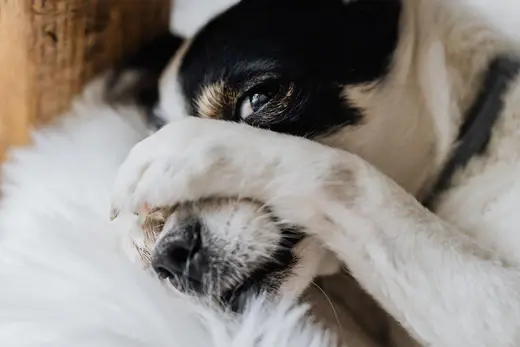Why Does My Dog Keep Licking His Butt? Causes and Solutions

Dogs enjoy grooming themselves, and that means they lick their butts. While, well kinda icky, it comes with the territory. But if you notice excessive licking, there could be another underlying issue. If you’re asking why your dog keeps licking its butt and what to do about it, in this article, we will discuss reasons your canine companion may pay extra attention to their rear end.
Dogs May Lick Because of Anal Glands
This is one of the most common reasons your pooch may lick their butt. These glands are located in the rectal area at the 4 pm and 8 pm positions if you viewed the area as a clock. In most dogs, these glands will express on their own any time they go to the bathroom. Occasionally these glands will fail to empty, causing them to become impacted or irritated. Your dog will show you either by scooting or licking at the area excessively.
When the glands are irritated, it is best that they are evaluated by your veterinarian first to determine if they need to be manually expressed. Sometimes irritated anal glands can be infected and antibiotics may be necessary. But oftentimes relief is found with manual expression. Also, there are supplements that make it easier for the anal glands to express naturally on their own if this is determined to be a chronic problem. These supplements contain a fiber source such as pumpkin which can help bulk up the feces, allowing the anal glands to empty when defecating. Glandex and No-Scoot are examples of supplements that can be used.
Allergies in the Skin Around Your Dog’s Bum
When a dog is itchy, besides scratching, it is common for them to lick the affected area. Allergies can be caused by things in the environment that your dog may be sensitive to, such as grass, pollen or molds. Once exposed to these allergens, the skin can experience redness, dryness and inflammation. So a dog licking its butt may be dealing with an allergy. A good shampoo with probiotics like Skout’s Honor Probiotic Shampoo can help ease symptoms and protect your dogs from skin allergies. Why probiotics? They help restore good bacteria to your dog’s skin, which can help reduce inflammation and itchiness.
Fleas: A Pesky Problem
These little pests can also have a role in your dog licking its butt. Some dogs can have an allergic reaction to the saliva of fleas when they bite, which causes intense itching. Fleas are found anywhere on your dog’s body, but they have an affinity for the rear end, especially around the tail. So if your dog is excessively licking, search the fur for fleas. A flea comb can be helpful in finding these. Fortunately, if fleas are the culprit, a good monthly flea preventative or Skout's Honor Flea+Tick Shampoo can keep them away and allow your dog to be itch-free.
Intestinal Parasites
Though less common, intestinal parasites can cause your dog to lick its rear due to irritation. Parasites such as tapeworms, whipworms, hookworms, and roundworms can cause discomfort. A fecal test can confirm the presence of parasites, and a dewormer can effectively treat the issue. In the case of tapeworms, combining flea control with deworming is essential.
So What Have We Learned About Itchy Bums?
Some licking can be part of normal grooming for your dog. But if your dog is excessively licking at its butt, it may indicate a medical issue. Having your veterinarian perform a physical exam on your pet can help narrow down potential causes. Suggested treatments can help provide relief, and Skout’s Honor products can play a significant role in helping your dog to stop if a skin allergy is causing the irritation.
Pro tip: Have your dog wear a cone temporarily to prevent him from causing further damage to his skin until you can get them seen by your veterinarian.
References:
Anal Sac Disease in Dogs
Flea Allergy Dermatitis
Atopic Dermatitis: Symptoms and Treatment
Dr. Dwight Alleyne is a veterinarian who has over a decade of experience treating cats and dogs. He is also the creator of the Animal Doctor Blog, where he provides general health advice and pet product reviews.
Next Article:
The Complete Guide to Dog Grooming Supplies




